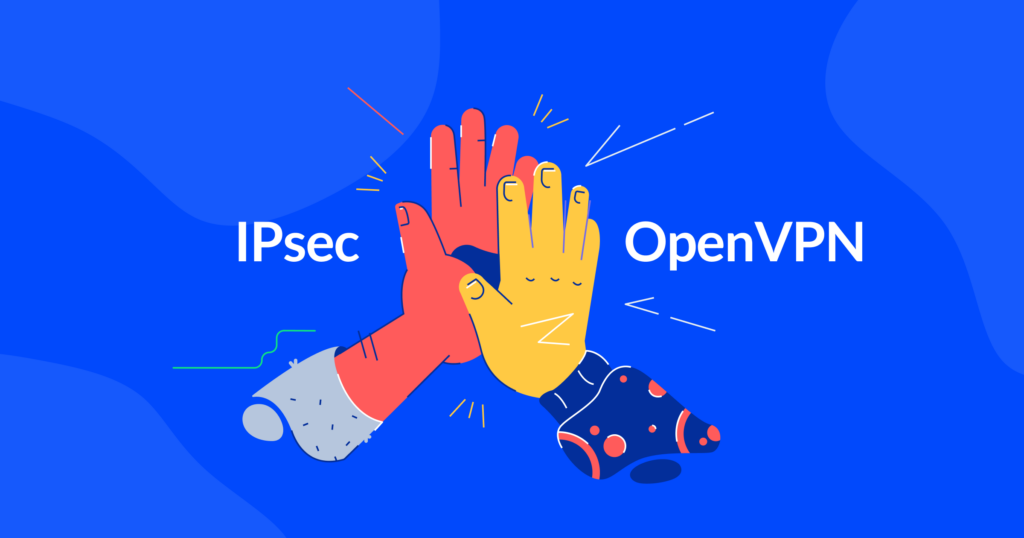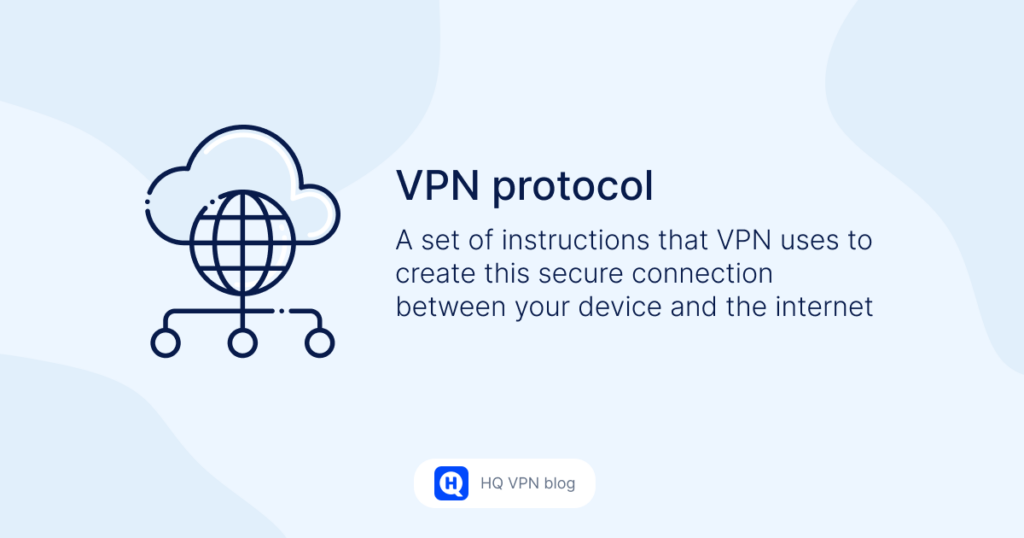

IPsec & OpenVPN: Power Duo For Secure and Fast Connection

In the online arena, where every click can have consequences, guarding your privacy is no longer a luxury — it’s a must. Your personal data is constantly in motion, vulnerable to prying eyes and lurking threats. Whether it’s your internet provider watching or hackers exploiting public Wi-Fi, your digital tracks are out there for all to see.
Enter the VPN, your virtual guardian. It uses robust protocols to shield your identity and secure your data. Among these protocols, IPSec and OpenVPN stand out.
But fear not, the choice isn’t a puzzle, especially if you don’t need to make it.
In this guide, we’ll target the spotlight on the power duo of IPSec and OpenVPN and show you how this combination of VPN protocols can significantly enhance your online experience. Let’s jump in!
What is a VPN protocol and why is it important?
A VPN protocol is like a set of rules that your device and a VPN server use to communicate securely. Think of it as the secret handshake they do to make sure your online activities stay private.

When you connect to the internet without a VPN protocol, your data is like an open book that anyone with the right tools can read. But with a VPN protocol, your data gets encrypted, which is like putting it in a locked box before sending it. This makes it incredibly difficult for anyone snooping around to understand what you’re doing online.
Paying attention to the VPN protocol when choosing a VPN service is like picking the right tool for a job. Different VPN protocols offer varying levels of security, speed, and compatibility. Here’s why it’s crucial:
- Security strength. Some protocols are like fortress walls, while others are more like fences. The protocol determines how tough your online shield is against hackers and snoopers. Picking a robust protocol ensures your data stays locked away from prying eyes.
- Performance. Just as cars have different speeds, VPN protocols have different speeds too. Some might be super fast for streaming and downloads, while others could be slower but more secure. Depending on your online activities, you’ll want a protocol that matches your speed needs.
- Device compatibility. Not all devices and platforms work seamlessly with every VPN protocol. If you’re using a particular device, like a smartphone or a router, you’ll want to make sure the VPN protocol you choose plays nicely with it.
- Location flexibility. Some protocols might work better in certain countries or regions. If you’re planning to use your VPN service to access content from around the world, you’ll want to ensure your chosen protocol can handle the job.
- Future-proofing. Technology evolves, and so does the strength of encryption methods. Opting for a VPN service that offers modern and up-to-date protocols ensures your protection stays effective as new threats emerge.
In a nutshell, the VPN protocol is the engine that drives your online security. By paying attention to it when choosing a VPN service, you’re ensuring that your digital adventures are both safe and smooth.
What is IPsec?
IPsec (Internet Protocol Security) is a framework of open standards. Simply put, is like a superhero cloak for your online activities. It works by creating a secure tunnel between your device and the VPN server. This tunnel wraps your data in layers of encryption, making it almost impossible for anyone to peek inside.
How Does it Work?
Imagine you’re sending a message to a friend. IPsec takes that message and locks it in a virtual safe. Only your friend’s device and the VPN server have the keys to open that safe. So, even if someone manages to intercept the message, all they see is a jumble of encrypted nonsense.
Distinctive Features
- Double protection. IPsec uses two encryption methods: one to protect your data and another to ensure the data’s integrity. It’s like having a lock and a security seal on your online package.
- Flexibility. It’s not picky about the data you’re sending. IPsec can handle all sorts of online stuff – from emails to video calls – and still keep it secure.
- Compatibility. IPsec is like a friendly translator. It can talk to different types of devices and operating systems, so you can use it on your smartphone, laptop, or other gadgets without any hassle.
Benefits
- High security. With its double layer of encryption, IPsec is like a digital fortress. It ensures that even if someone intercepts your data, they won’t be able to make heads or tails of it.
- Versatile use. Whether you’re working, streaming, or just browsing cat videos, IPsec has got you covered. It’s versatile and can handle all sorts of online tasks securely.
- Trusted technology. IPsec has been around for a while, earning its stripes as a reliable and respected protocol. You can trust it to keep your online activities private.
So, if you’re looking for a VPN protocol that’s like a trustworthy bodyguard for your data, IPsec is a strong contender. It’s all about creating a secure path for your online adventures, making sure you can explore the digital world with confidence.
What is OpenVPN?
OpenVPN serves as the standard security technology for establishing secure connections between devices and networks, whether they’re far apart or right next to each other. It’s your online safeguard, ensuring your data’s protection from any unwelcome attention.
How Does it Work?
OpenVPN kicks off by encrypting data packets the moment they depart from your device.
Upon reaching the OpenVPN server, a secret key comes into play, decrypting the data packets to make them intelligible solely to their intended target.
These now-decrypted packets continue their journey to the specific web server you’re aiming for.
From there, the requested data is sent back to the OpenVPN server, where it undergoes re-encryption.
Ultimately, the re-encrypted data packet circles back to your device with the OpenVPN client, which then skillfully decrypts it. This seamless process ensures you receive your desired online content with the added bonus of privacy.
Distinctive features
- Flexibility. OpenVPN is like a chameleon – it can adapt to different types of networks, whether you’re on Wi-Fi, 4G, or even a wired connection. It’s your VPN companion no matter where you go.
- Security & authenticity. It’s like a digital signature for your data. OpenVPN doesn’t just protect your information; it also verifies that it’s coming from a legitimate source.
- User-friendly. OpenVPN is known for its user-friendly nature. It’s not a tech puzzle. Just a couple of clicks, and you’re on your way to a secure browsing experience.
Benefits
- Top-notch security. OpenVPN is like a fortress for your data. Its robust encryption ensures your online actions remain private, shielding you from cyber snoops.
- Reliable performance. It’s designed to balance security and speed, so you get a seamless online experience without compromising safety.
- Widely trusted. OpenVPN has gained the trust of tech experts and security buffs alike. It’s an open-source protocol, meaning lots of clever minds are continuously working to keep it strong.
So, when you’re seeking a VPN protocol that’s like a trustworthy companion in your online escapades, OpenVPN stands tall. It’s all about making your digital journeys secure, allowing you to explore the internet’s wonders without worrying about your privacy.
OpenVPN + IPsec: iconic duo for the win
Pairing OpenVPN and IPsec in a single VPN service is like having two layers of armor that complement each other perfectly. Here are the potential benefits of this powerful combination.
- Unparalleled security. OpenVPN and IPsec bring their own unique strengths to the table. By combining them, you get a dual-layered security approach that’s incredibly tough to breach. It’s like having a digital fortress within a fortress.
- Versatility. Some devices might work better with one protocol than the other. With OpenVPN and IPsec together, you have flexibility. You can choose the protocol that fits each device best, ensuring a seamless and secure connection across your tech arsenal.
- Adaptability. Sometimes, certain networks might be more compatible with one protocol over the other. Having both OpenVPN and IPsec allows you to switch between them as needed, ensuring you’re always connected securely.
- Enhanced anonymity. OpenVPN excels in masking your online identity, while IPsec is a master of data encryption. When paired, they create a cloak of anonymity that not only hides your online presence but also scrambles your data into an unreadable code.
- Optimized performance. IPsec can sometimes offer faster speeds for certain tasks, while OpenVPN is known for its balance between speed and security. Combining both protocols allows you to prioritize speed when needed without compromising overall security.
- Geographical freedom. Some countries or networks might favor one protocol over the other due to varying censorship or restrictions. With the OpenVPN and IPsec duo, you have a better chance of accessing content from around the world, no matter where you are.
- Future-proofing. Technology evolves rapidly, and security threats change with it. Having both OpenVPN and IPsec as part of your VPN service ensures you’re well-prepared for any security challenges that lie ahead.
At HQ VPN, we understand that security and speed are both crucial for a smooth and enjoyable online experience. That’s why we’ve chosen to use both OpenVPN and IPSec protocols in our service.
By using both OpenVPN and IPSec, HQ VPN is able to provide a balance of security and speed that’s unmatched by other VPNs. With HQ VPN, you can enjoy the peace of mind that comes with knowing your online activity is always protected, while still being able to stream and game at lightning-fast speeds.
Try HQ VPN now and experience the best of both worlds!
Wrapping up
IPSec and OpenVPN are two popular VPN protocols that provide encryption and security for internet users, with IPSec offering faster speeds and native support on most platforms, while OpenVPN is highly configurable and known for its strong security.
IPSec has the potential to be compromised by the NSA, while OpenVPN has no known security vulnerabilities, making it the more secure option.
OpenVPN is the best all-around VPN protocol, offering reliability, stability, and compatibility across various devices and networks, making it suitable for most users.
HQ VPN is where security and speed unite seamlessly. Our blend of OpenVPN and IPSec protocols ensures powerful protection and swift connections. With HQ VPN, you experience top-tier security while enjoying lightning-fast streaming and gaming.



